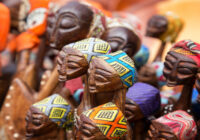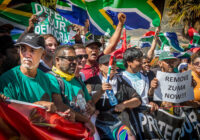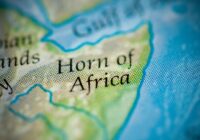Even as Africa democratizes and strengthens the African Union, it faces a period of slow economic growth and rising debts that could lead to a crisis.
In 2016, the authors began the momentous journey of narrating the oft ignored story of Africa. Our readers responded most positively and asked for an encore. More than willingly, we have decided to oblige.
In our very first edition of Africa This Month in January 2016, we held the view that despite its trials and tribulations, the great continent was on the march forward. Of course, there will be setbacks in this journey. Great challenges remain. How will Africa find jobs for its billion-plus people at a time of automation and artificial intelligence? Will nature, resplendent in its full glory, survive Africa’s population explosion and economic growth? Is it possible for Africa to get out of its debt trap? Can Africans preserve their social fabric as strains of inequality, ethnic rivalries and religious tensions begin to rise?
None of these questions have easy answers. Even deep thought, cool heads and warm hearts will only lead to imperfect answers. We will do our bit to ask questions, suggest answers and tell Africa’s abundant stories with perspicacity, poise and panache.
THE GAMBIA’S NEW LEADER TAKES CHARGE
In the December 2016 edition of Africa This Month, the authors observed how Yahya Jammeh lost the Gambian elections after 22 years in the saddle despite intimidating voters through his goons. As a stereotypical dictatorial big man, he had run a kleptocratic, repressive and intolerant regime that robbed, jailed and killed Gambians with wanton abandon. As a deft dictator, Jammeh clung onto power, refusing to accept the result of the elections.
On January 21, Jammeh finally announced that he would step down. Considerable pressure from the Economic Community of West African States (ECOWAS), the African Union (AU) and the United Nations (UN) seems to have paid off. ECOWAS troops had entered The Gambia and, after nearly two months of flip flopping, the country’s defense chief pledged allegiance to Adama Barrow, the man who beat Jammeh in the polls.
As Jammeh flew off into exile, Barrow was sworn in at the Gambian embassy in Dakar in neighboring Senegal. It turns out that 46,000 Gambians have fled to Senegal since Jammeh triggered a constitutional and political crisis by refusing to accept the election result. Now, they can return to their homes. They might find their poor country poorer when they return. Like Fulgencio Batista who fled Cuba when Fidel Castro took over in 1959, Jammeh has apparently taken $11 million for his retirement in Equatorial Guinea.
For the moment, the sun is shining brightly in The Gambia. Optimism there is ubiquitous. Barrow has promised reforms that include media freedom and the rule of law. He has also declared that the country will henceforth be a de jure secular state, not an Islamic republic. It is worth noting that 95% of the country’s near 2 million people are Muslim. Worryingly, Barrow has retained the country’s dreaded secret police that is blamed for forced disappearances, torture and killings of thousands of Gambians. He has also retained the flip flopping, peace loving defense chief, Ousmane Badjie. Barrow might not be ruffling either the secret police or the military to ensure stability in a deeply divided country. Yet there is the abiding risk of not much changing with no change in the structure of the state.
This structure is problematic for most former colonies, including democratic ones such as Kenya, South Africa and India. The colonial state was set up to be a repressive and often predatory entity. Concentration of power in the hands of a few individuals who unabatedly wielded the instruments of coercion was the norm. Institutions were subservient. These states did not emerge organically after centuries of evolution and war as in Europe or North America, but through rapid conquest and colonization. Africans now want transformative leaders like Nelson Mandela who are willing to redefine the social contract between the citizen and the state.
 This is a tall order for any leader, especially Barrow. He inherits a country with deep social and economic inequality. Over 60% of Gambians live in poverty. The economy is in tatters and The Gambia is bankrupt. Jammeh’s tribalism has left the country fractured along ethnic lines. Frail faith in the future of the country is all that is left for many Gambians to hold onto. With about 2 million people and a fair bit of distance from the Mediterranean Sea, The Gambia accounted for a fifth of the people who arrived in Italy after perilous sea voyages in flimsy boats. Barrow will need all the help he can get and the authors wish him luck.
This is a tall order for any leader, especially Barrow. He inherits a country with deep social and economic inequality. Over 60% of Gambians live in poverty. The economy is in tatters and The Gambia is bankrupt. Jammeh’s tribalism has left the country fractured along ethnic lines. Frail faith in the future of the country is all that is left for many Gambians to hold onto. With about 2 million people and a fair bit of distance from the Mediterranean Sea, The Gambia accounted for a fifth of the people who arrived in Italy after perilous sea voyages in flimsy boats. Barrow will need all the help he can get and the authors wish him luck.
AFRICAN UNION GETS NEW LEADERS AND A NEW MEMBER
Moussa Faki Mahamat, Chad’s foreign minister, has emerged as the new chairperson of the AU Commission. The 56-year-old father of five edged out his closest rival, Kenyan Foreign Minister Amina Mohamed, after an exhausting seven rounds of voting. The vigorous election process demonstrates that African states are taking the AU seriously, and the body is likely to increase in importance in the years to come.
Only last July, not all seemed well. Nkosazana Dlamini-Zuma’s term as chairperson of the AU Commission was extended by six months to give potential candidates more time to canvas. The AU’s election process had not quite been efficient, organized or on time. Yet it is starting to find its voice despite its imperfections. Against the backdrop of the fervent campaigns for her seat, a lame duck Dlamini-Zuma courageously spoke out against US President Donald Trump’s executive orders that ban travel from seven Muslim-majority countries and stop refugee resettlement for 120 days.
Even as Dlamini-Zuma ponders her role in South African politics where some expect her to succeed her ex-husband to the presidency, Mahamat is making the right pronouncements about the future of the AU. He has pledged to boost development and security while streamlining the organization’s bureaucracy. Mahamat has promised to “refocus on the basics” and admitted that the AU has “implemented less than 15% of the 1,800 resolutions adopted since 2002.”
This is the AU’s biggest challenge. Supranational bodies run the risk of becoming removed from the lives of ordinary citizens. Like the UN and the European Union, they can often become bureaucratic mazes that turn less effective over time. The former is increasingly ineffective and many nation states no longer give it as much importance as in the past. The latter is suffering a populist backlash of which Brexit is only the most spectacular example. Implementing resolutions and becoming more relevant to the lives of the common men and women of Africa will be the AU’s and Mahamat’s big challenge.
The AU also elected a chairperson. This position is different to that of the chairperson of the AU Commission. The head of an African state assumes this largely ceremonial position for a year. This year, Guinean President Alpha Condé is taking over from Chadian President Idriss Deby. Condé is a veteran who campaigned for democracy for years, suffering exile, imprisonment and assassination attempts. Of late, Condé has lost a bit of his luster. Critics have accused him of corruption and economic mismanagement. In August 2016, over half a million marched in protest.
Despite the controversy, even Condé’s critics acknowledge that he is charismatic and intelligent. This should make him a decent ceremonial chief for the AU.
Apart from electing new leaders, the AU welcomed back Morocco into the fold after 33 years. Morocco had left the union over a dispute regarding Western Sahara. In 1975, Morocco annexed this former Spanish colony. A 16-year insurgency by the indigenous Sahrawi followed before a UN-brokered truce in 1991. Yet the question of Western Sahara remains unsettled and caused a tense debate in the AU with emotions running high. Morocco’s membership was supported by 39 countries and opposed by nine. Western Sahara’s Polisario leader and member of the Sahrawi delegation, Mohamed Beiset, told Al Jazeera that the AU decided it is “better to have Morocco inside the house, inside the family, and to try to reach African solutions to African problems” than persist with the status quo.
It is important to note that Morocco has been readmitted on the understanding that Western Sahara would continue to be a member of the AU. A key reason for readmitting Morocco was money. The AU has long been criticized for depending on non-African donor funding. With the addition of wealthy Morocco as its 55th member, the AU might be able to reduce that dependence and thereby increase its significance.
MOZAMBIQUE DEFAULTS ON “TUNA BOND”
At the outset, we acknowledged that Africa faces some dark clouds. One such dark cloud is debt. A 1990 paper by Alex Danso on the African debt crisis estimated the continent’s debt to be a massive $230 billion, equivalent to almost three times the continent’s annual export earnings. This was expected to jump to $550 billion in 10 years.
Richard Walker warned about the coming African debt crisis in a brilliant article that remains chillingly relevant today. In 2014, Africa had the fastest-growing continental economy in the world. Walker pointed out that its debt was growing even faster. Personal, corporate and government debt were all rising to record highs. Those buying this debt were fundamentally betting on the African growth story. That story has unraveled as demand for commodities has fallen and their prices have crashed.
A year ago, the January 2016 edition of Africa This Month explained how the global economic slowdown was afflicting Africa. The continent’s exports to China have been falling and Chinese investment in Africa is declining. Poor political choices, economic mismanagement and corruption have not helped. Rising temperatures, decreasing rainfall and devastating droughts worsened an already poor situation.
The October 2016 Regional Economic Outlook of the International Monetary Fund (IMF) estimated that “economic growth in sub-Saharan Africa this year is set to drop to its lowest level in more than 20 years.” The average growth of 1.5% was well below population growth, making Africans worse off in per capita terms. Furthermore, the policy response of the hardest-hit countries was leading “to rapidly rising public debt.”
Obviously, not all African countries sailed in the same boat. Some did better than others, but the bottom line is that far too many Africans suffered in 2016. It turns out that Mozambique is one of those countries. In 2013, its state-owned fishing company, Ematum, borrowed $500 million from Credit Suisse and $350 million from Russian bank VTB to finance a new tuna fishing fleet. At the time, this was 6% of Mozambique’s entire gross domestic product (GDP), making this a pretty big sum for a rather small economy.
Despite the financial bubble of the previous decade and the Great Recession, Ematum securitized its debt with the help of Credit Suisse and BNP Paribas, two rather famous European banks. The worthy bankers sliced Ematum’s debt into smaller chunks, issued them as unlisted securities and sold them to investors chasing higher returns. Thus, Mozambique’s “tuna bonds” were born.
Once Ematum got the cash, it did what developing world public sector units invariably do. First, it bought cannon-bearing patrol boats and drones, a rather useless investment. Second, it failed to create viable commercial operations. Third, it was unable to prevent waste and possibly corruption by its employees. For instance, Ematum claims to have bought boats from France for $100 million more than their market price. Ematum needed to earn $260 million per annum to service both the interest and the principal of the debt. This meant 200,000 tons of tuna. Needless to say, the company fell short. In 2014, Ematum reported a loss of $25 million. By the end of 2015, in Frances Coppola’s words, “Ematum was in deep water and sinking fast.”
Since the Mozambique government had guaranteed Ematum’s bonds, it was supposed to repay investors but falling commodity prices and poor agricultural harvests decimated public finances. Both of them led to lower government revenues, causing the deficit to rise to a whopping 11% of Mozambique’s GDP. In 2016, Moody cut the country’s sovereign debt rating to the lowest of junk status. This year, Mozambique has defaulted, which according to the IMF is no surprise.
Creditors such as AllianceBernstein, Franklin Templeton Investment Management, Greylock Capital Management, NWI Management and Pharo Management are not pleased and have called Mozambique’s default unnecessary. David Ndii, the erstwhile African economist from Kenya, blames the investors. He argues that creditors were merely optimizing their portfolios and did not care where their money ended up. He astutely points out that Franklin Templeton and AllianceBernstein have $850 billion and $480 billion in assets under management, respectively. An investment of, say, $100 million by Templeton translates to 0.01% of its portfolio. In contrast to the huge sums of these fund managers, Mozambique’s GDP is barely $14.8 billion. Therefore, he takes the view that creditors and not Mozambique’s taxpayers should absorb the losses.
Africa might be on the verge of its own version of the Latin American debt crisis of the 1980s that led to the “lost decade” in that continent. Walker warned how history repeats itself in cyclical, resource-dependent economies, sometimes with a twist. By 2008, Africa’s debt to GDP ratio had fallen to less than 30% thanks to debt forgiveness and booming commodity prices. Now, it is back to 70%.
In Walker’s words, this time Africa’s debt crisis is different and could be worse. African states have borrowed money from private investors as government loans and assistance have fallen out of fashion. Commodity prices and growth rates have dropped while populations and deficits have increased. Even more importantly, African debt is denominated in foreign currencies like the dollar. African countries do not have the luxury of issuing debt in their own currencies unlike the US. So, when their currencies depreciate vis-à-vis the dollar, their debt burden skyrockets.
This is what has happened to Mozambique. Its currency has been falling for the last two years and it can no longer pay back its debts. This could happen to other African countries that might join Mozambique in defaulting on their debts. Walker rightly observes that “private lenders are less forgiving” and defaults might upend the African growth story, destroy confidence in the continent’s economies and threaten social stability itself. Therefore, African leaders have to decisively and immediately deal with the dark cloud of debt that is darkening their skies.
The views expressed in this article are the author’s own and do not necessarily reflect Fair Observer’s editorial policy.
Photo Credit: Mark Rubens
Support Fair Observer
We rely on your support for our independence, diversity and quality.
For more than 10 years, Fair Observer has been free, fair and independent. No billionaire owns us, no advertisers control us. We are a reader-supported nonprofit. Unlike many other publications, we keep our content free for readers regardless of where they live or whether they can afford to pay. We have no paywalls and no ads.
In the post-truth era of fake news, echo chambers and filter bubbles, we publish a plurality of perspectives from around the world. Anyone can publish with us, but everyone goes through a rigorous editorial process. So, you get fact-checked, well-reasoned content instead of noise.
We publish 2,500+ voices from 90+ countries. We also conduct education and training programs
on subjects ranging from digital media and journalism to writing and critical thinking. This
doesn’t come cheap. Servers, editors, trainers and web developers cost
money.
Please consider supporting us on a regular basis as a recurring donor or a
sustaining member.
Will you support FO’s journalism?
We rely on your support for our independence, diversity and quality.






